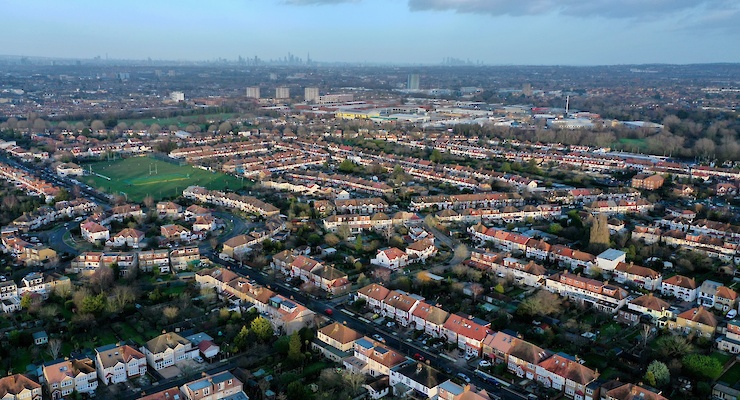


Head of Content

Mortgage Advisor & Director
Fixed Rate Mortgage vs Variable: Pros and Cons Explained

Are you thinking about getting a mortgage but finding it confusing with all the different options out there? Don't worry, we're here to lend a hand and guide you through the world of fixed-rate and variable mortgages.
In this article, we'll dive into the advantages and disadvantages of each type, talk about important factors to consider when making your choice and explore popular types of variable rate mortgages as well as strategies for managing any potential risks that come with them.
By the time you finish reading this, you'll have a clearer understanding of the differences between fixed-rate mortgages and variable mortgages.
That way, you'll feel more confident and ready to make a well-informed decision that matches your financial goals and risk comfort level. At Teito, we understand that buying a home is a significant financial decision. That's why our team of experts is dedicated to guiding you through the process and finding the best mortgage deal tailored to your unique needs.
Carry on reading to learn more or start your mortgage journey now.
Short Summary
- Broadly speaking, fixed and variable-rate mortgages are the two main mortgage types available in the UK.
- It is important to understand the differences between the two before making an informed decision.
- As with any financial decision, you should consider your personal situation when choosing a mortgage.
Understanding Fixed and Variable Mortgages
When it comes to mortgages, there are two primary categories: fixed-rate mortgages and variable-rate mortgages.
Fixed Rate Mortgage
A fixed-rate mortgage is a type of loan where the interest rate remains constant over a set period of time.
- One of the main benefits of a fixed-rate mortgage is the certainty it provides: your monthly payments will remain consistent for the initial period, allowing for easier budgeting and financial planning.
- With fixed rates, you can enjoy the stability and predictability that comes with this type of mortgage.
That being said, if market interest rates fall, you won’t benefit from the lower rates and may pay more in interest than you would have with a variable-rate mortgage. You are also more likely to face paying Early Repayment Charges if you need to exit your initial term early. For example, if your circumstances change or, if your mortgage is not portable and you need to move house, you could end up with substantial fees to pay.
Variable Rate Mortgage
Variable rate mortgages, also known as variable mortgages, have variable interest rates that can change over time.
- These mortgages can offer some benefits, such as a lower initial interest rate and potential savings if interest rates drop.
- However, variable-rate mortgages come with their own set of risks. If interest rates rise, your monthly payments may increase, potentially making it more difficult for you to manage your mortgage obligations.
- Depending on your mortgage deal, your interest rate may track the Bank of England Base Rate, the LIBOR rate, or with a Standard Variable Rate (SVR) mortgage, be set by the individual lender.
Variable rate mortgages may also come with Early Repayment Charges for the initial term.
This uncertainty can be a significant drawback for some borrowers who prefer the predictability and stability of a fixed-rate mortgage.
Factors to Consider When Choosing Between Fixed and Variable Rates
When deciding between fixed and variable-rate mortgages, it's recommended to consider the current market conditions and your own financial profile. By considering these factors, you can make an informed decision that best suits your unique circumstances and risk tolerance.
Market Conditions
Market conditions, such as economic growth and inflation, can have a significant impact on interest rates.
- For example, during periods of high inflation (as we have seen in the past couple of years), interest rates may need to increase to help keep inflation in check.
- Interest rates may also be reduced to stimulate growth, such as following the global financial crisis of 2008.
Understanding the current market conditions and how they may influence interest rates can help you determine whether a fixed or variable-rate mortgage may be more advantageous.
Borrower's Financial Profile
Your financial profile and preferences play a vital role in determining the best type of mortgage for your situation.
- Factors such as your income stability and long-term financial goals should be taken into account when choosing between fixed and variable-rate mortgages.
- For example, if you're financially secure, you may be more comfortable taking on the risk of a variable-rate mortgage in the hope of benefiting from potential interest rate drops.
- However, if your financial situation is less stable, the predictability and security of a fixed-rate mortgage may be more appealing.
Popular Types of Variable Rate Mortgages

There are various types of variable mortgage, each with its own unique features and potential benefits. In this section, we’ll discuss three popular types: tracker mortgages, discounted rate mortgages, and standard variable rate mortgages.
Understanding the differences can help you determine which option may be best suited for your financial situation and risk tolerance.
Tracker Mortgage
A tracker mortgage is a type of variable mortgage that follows a specific benchmark rate, such as the Bank of England’s base rate.
- This means that your interest rate will fluctuate in line with the benchmark rate, potentially providing savings if the benchmark rate decreases.
- However, as with any variable-rate mortgage, there’s a risk that your interest rate may increase if the benchmark rate rises. This could result in higher monthly payments and increased financial strain.
Discounted Rate Mortgage
A discounted rate mortgage offers a temporary reduction in the lender’s standard variable rate.
- This can result in lower initial monthly payments, providing some initial financial relief.
- However, it’s important to remember that this discounted rate is temporary, and once it expires, your interest rate will revert to the lender’s standard variable rate.
Standard Variable Rate Mortgage (SVR)
A standard variable rate mortgage is based on the lender’s standard variable rate, which can change at any time.
- Unlike tracker mortgages, the interest rate on an SVR mortgage is not directly tied to a specific benchmark rate, such as the Bank of England’s base rate.
- While SVR mortgages can offer some flexibility, they also come with the risk of fluctuating interest rates.
- If market conditions change and the lender decides to increase their interest rate, you will face higher monthly payments.
- SVR mortgages tend to have higher interest rates than other fixed or variable rate mortgages.
There are generally no Early Repayment Charges to consider on SVR mortgages, leaving you free to remortgage at any time. In some situations it may be worthwhile staying on an SVR for a short period of time, for example, if you're in the process of moving home.
Final Thoughts
In conclusion, the choice between fixed and variable mortgages depends on a variety of factors, including market conditions, your financial profile, and your risk tolerance. Each type of mortgage has its own set of benefits and drawbacks that should be carefully considered before making a decision.
By understanding the differences you can make a well-informed decision that best aligns with your financial goals and risk tolerance.
Whether you're a first-time buyer, looking to remortgage, or in need of a buy-to-let mortgage, our team at Teito can help. We simplify the mortgage application process, saving you time and effort while providing personalised support every step of the way.
With access to the entire lending market, we can compare interest rates, terms, and fees to ensure you get the most competitive options available. Our goal is to help you secure a mortgage that fits your budget and long-term goals. Get started now and get a mortgage in principle quickly.
Choosing an Adviser
Selecting a qualified and experienced mortgage adviser is of great importance. To choose a suitable adviser, evaluate their qualifications, experience, and reputation, and ensure they are regulated by the Financial Conduct Authority (FCA).
Read reviews from previous clients and make sure they provide a clear explanation of the products and services they offer, as well as the fees and charges associated with them.


























































































































































